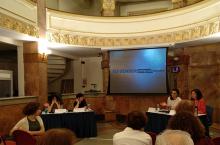Sabancı University Gender and Women's Studies Center of Excellence organized a panel titled "Art, Imagination, Resistance" on Saturday, 28 April 2018, at Karaköy Minerva Palas with Dina Georgis from the Women & Gender Studies Institute, University of Toronto, as the keynote speaker.
Ayşe Gül Altınay, Director of Sabancı University Gender and Women's Studies Center of Excellence, gave the opening speech of the panel. The keynote speaker of the panel was Dina Georgis from the Women & Gender Studies Institute, University of Toronto. Dina Georgis gave a speech titled "The Queer Feeling of Hope."
Dina Georgis addressed the issue of radical hope with reference to the movie “The Idol” set in Gaza. In her speech on the movie, Georgis said that rebellion is about the human desire to create something new. Stating that play is at the root of creative rebellion, Georgis added that curiosity disappears especially in adulthood and said: "A child must forget about pleasure and curiosity in order to become an adult."
Mentioning the relationship between the individual and the environment and the importance of the transference there, Georgis concluded by saying: “The important thing is how radical hope should be understood. Creating something contains the source of hope. Only if a child is creative can the child treat any relationship positively or negatively. Collective curiosity is also very important here.”
After the keynote speech, the panel titled "The Aesthetics and Possibilities of Artistic Practice" started. The speakers of the panel were Nora Tataryan from the Women & Gender Studies Institute, University of Toronto, Banu Karaca, Researcher from Istanbul Policy Center, Sabancı University, and Tuğçe Tuna, Head of the Contemporary Dance Department, Mimar Sinan Fine Arts University.
Nora Tataryan said that she studied how aesthetics and aesthetic thinking opened up a political space in her work. She added that her research was about how two seemingly contradictory things could stand side by side. Stating that certain mistakes made by art allow some things to be revisited, Tataryan said: "Aesthetics will save us from the one-dimensional dilemmas of rationalism." Pointing out that unlike the police society, not everything has a place in the aesthetic society, Tataryan said: "Everything can be turned upside down and new things can be produced."
Banu Karaca focused on the history of dispossession in her speech. Banu Karaca stated that due to the Alphabet Revolution, there was a disconnect between those born in the Turkish Republic period and those born in the Ottoman period. She added that those born in the Ottoman period lost their literacy after the Alphabet Revolution. Saying that the history of Turkish art covered the period starting from 1923, Banu Karaca said: "This makes us think that the Ottoman period never existed."
Tuğçe Tuna said: “I think that everything we create reflects our uniqueness. Since 1993, I have focused on body in my work. I realized that the body has a storage mechanism. Kinesthetically, this legacy is passed down from generation to generation.”
Source: GazeteSU
